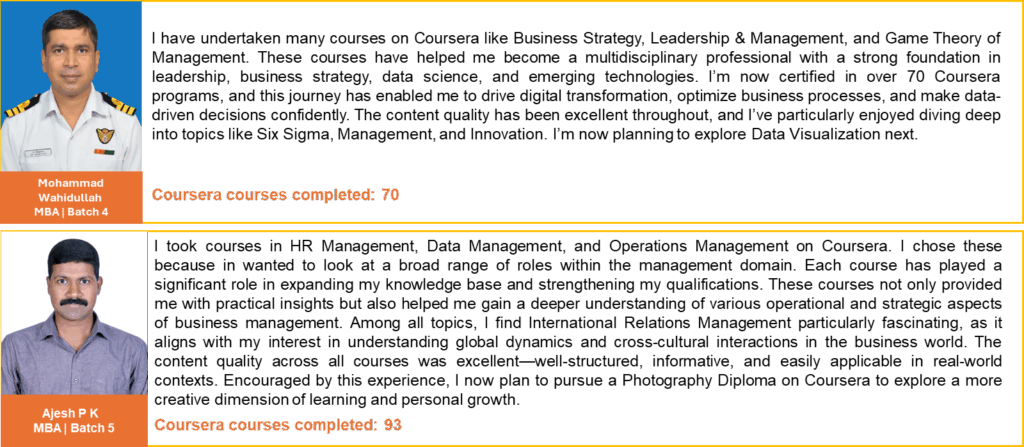Listen to this blog
Today, the job market is rapidly changing, and a degree is no longer the only factor that matters – you also need to have practical skills, experience in the industry, and the ability to learn fast. Online Manipal and Coursera are the two entities that come in here, thus changing the manner in which students gear up for their careers. Why are so many learners turning to this dynamic duo? Because it blends the credibility of UGC-entitled degrees from Online Manipal with the flexibility and global exposure of Coursera’s industry-certified courses.
What does it change for students? It means that you can get your degree and at the same time pick up skills that are needed in the real world such as data analytics, digital marketing, or AI—directly from global leaders like Google, IBM, and Meta. How? Via integrated access to 8,400+ courses offered by various world-renowned universities and industry partners, which is part of your Online Manipal curriculum.
The beginning of this partnership can be traced to a task to play: Bridging the gap between academic learning and employable skills. If you are a working professional or a fresh graduate, the combined power of Online Manipal and Coursera will make it possible for you not only to learn but to prepare to lead.
Also read: Best Coursera Certifications for MUJ Online PG Students
Integrating Coursera: Bridging Academia and Industry
The collaboration with Coursera has played a pivotal role in enhancing learner experience at Online Manipal. These educational programs provide a plethora of in-demand skills, ranging from data analysis to digital marketing, thus making students able to match industry requirements.
How Online Manipal Achieved 400,000+ Hours of Learning on Coursera
Online Manipal’s association with Coursera has achieved more than 400,000 hours of learning because of a clear strategy: make learning a habit. We issue monthly course suggestions adjusted to each stream—management, IT, arts, etc.—and thus enable students to discover the shortest and most accessible courses on Coursera. This changed the game because enrollment surged from 9% in April 2022 to more than 50% by 2024. It is also worth noting that among those who decided to participate in Coursera, 95% of them were very active on the platform.
Embedding into the syllabus, career-ready credentials, and continuous learner involvement through various channels such as newsletters, recognition programs like “Coursera Champions,” and community support were the main drivers for this engagement.
Additionally, instructors and partner institutions are capitalizing on their professional experience by taking advantage of directed assignments, mini-courses, and lifelong learning. The number of Coursera licenses rose from 12,000 in 2021 to 100,000 now. Online Manipal’s learner-first model was mentioned in Coursera’s 2022 Adoption Day webinar as a core example of global best practice.
This partnership is not just about access but about the power of education, employability, and lifelong learning.
Student Success Stories and Academic Impact: The Coursera Advantage at Online Manipal
Online Manipal learners talk about Coursera as a great degree booster, giving them flexibility, access to the best brains around the globe, and real-world skills that are directly applicable to the job market.
Some of the most important points:
- Better career outcomes: A BCA student became a cybersecurity leader; a working mom finished 100+ courses while doing her MBA, thus regaining career momentum and confidence.
- Improved academic performance: 75% of learners who worked with Coursera outperformed the average of their batch, and 73% managed to get CGPAs ≥8 (among those who completed 10+ courses at the rate of 50 %+).
- More enrollments and higher retention: The integration of Coursera resulted in a higher number of program enrollments and better retention, as the students appreciate a curriculum that is more industry-oriented and self-paced.
- Learning is more empowered: Students are given the option to be the masters of their own education, to enter the world of new majors, and to acquire the skills that are in high demand in the market beyond the class by Coursera Manipal.

Online Manipal’s partnership with Coursera is definitely the source of a new breed of confident, employable graduates.
Read more: Fueled by Passion, Powered by Coursera: The Journey of Our Champions
Explore Industry-Aligned Courses Available with Your Degree
Being a student at Online Manipal, you not only get a degree but also create an opportunity to take world-class Coursera courses that are designed to improve your academic and career skills. These courses, led by faculty of the best global universities and the industry, have been blended with your program for you to gain more knowledge and increase your chances of getting a job.
| Domain | Course Name | University / Industry Partner |
|---|---|---|
| Information Technology | Technical Support Fundamentals | |
| Operating Systems and You: Becoming a Power User | ||
| Computer Architecture | Princeton University | |
| Using Python to Interact with the Operating System | ||
| Data Structures | University of California San Diego | |
| Data Structures and Performance | University of California San Diego | |
| Introduction to HTML5 | University of Michigan | |
| Building Web Applications in PHP | University of Michigan | |
| Basic Data Descriptors, Statistical Distributions, and Application to Business Decisions | Rice University | |
| Java Programming: Principles of Software Design | Duke University | |
| Parallel Programming in Java | Rice University | |
| Software Development Processes and Methodologies | University of Minnesota | |
| Computer Science: Programming with a Purpose | Princeton University | |
| Advanced Algorithms and Complexity | University of California San Diego | |
| Genome Assembly Programming Challenge | University of California San Diego | |
| Network Security & Database Vulnerabilities | IBM | |
| HTML, CSS, and Javascript for Web Developers | Johns Hopkins University | |
| Single Page Web Applications with AngularJS | Johns Hopkins University | |
| Management | Integrated Marketing Communications | IE Business School |
| Advertising and Society | Duke University | |
| From Brand to Image: Creating High Impact Campaigns | IE Business School | |
| Branding and Customer Experience | IE Business School | |
| Managing Uncertainty in Marketing Analytics | Emory University | |
| Introduction to Social Media Marketing | Meta | |
| Social Media Management | Meta | |
| Fundamentals of Social Media Advertising | Meta | |
| Measure and Optimize Social Media Marketing Campaigns | Meta | |
| Digital Strategy and Business Opportunity | Digital Marketing Institute | |
| Market Research and Consumer Behavior | IE Business School | |
| Leading Transformations: Manage Change | Macquarie University | |
| Supply Chain Analytics Essentials | Rutgers University | |
| Procurement & Sourcing Introduction | Rutgers University | |
| Understanding Financial Statements: Company Position | University of Illinois Urbana-Champaign | |
| Digital Business Models | Lund University | |
| Supply Chain | Data-Driven Process Improvement | SUNY University at Buffalo |
| Applied Analytics and Data for Decision Making | SUNY University at Buffalo | |
| Managing Project Risks and Changes | University of California, Irvine | |
| Demand Analytics | Rutgers University | |
| Inventory Analytics | Rutgers University | |
| Strategic Sourcing | Rutgers University | |
| Supply Chain Logistics | Rutgers University | |
| Supply Chain Planning | University of California, Irvine | |
| IT Infrastructure and Emerging Trends | University of Minnesota | |
| Engineering Project Management: Risk, Quality, Teams, and Procurement | Rice University | |
| Data Science | Introduction to Data Science in Python | University of Michigan |
| Applied Machine Learning in Python | University of Michigan | |
| Applied Social Network Analysis in Python | University of Michigan | |
| Data Analysis with Python | IBM | |
| Exploratory Data Analysis | Johns Hopkins University | |
| Bayesian Statistics: From Concept to Data Analysis | University of California, Santa Cruz | |
| Inferential Statistics | Duke University | |
| Supervised Machine Learning: Classification | IBM | |
| Machine Learning with Big Data | University of California San Diego | |
| Business Analytics | Relational Database Support for Data Warehouses | University of Colorado System |
| Getting Started with Data Visualization in R | Johns Hopkins University | |
| Exploring and Preparing your Data with BigQuery | Google Cloud | |
| Hypothesis-Driven Development | University of Virginia | |
| Python Basics | University of Michigan | |
| Introduction to Structured Query Language (SQL) | University of Michigan |
Online Manipal’s Vision for Coursera Integration
We have decided to completely transform the way education is delivered by incorporating Coursera into the curriculum of most of our programs. Here’s the road ahead to Manipal Coursera:
- Credit-Bearing Courses: Allowing the students to choose a set of Coursera courses along with their degree for more convenience and thus maintaining academic quality worldwide.
- Structured Learning Paths: Pre-assembled learning trips, testing, and certificates to gain work-ready skills.
- Reduced Redundancy: Cutting down content delivery to the targeted ones without repetition of staff and thus increasing the focus on the practical part of the students.
- Access to Global Expertise: Learners get free world-class course content and faculty even though they are still in the online degree program learning ecosystem.
- Scalable, Job-Relevant Education: A future-ready approach that delivers job-related quality learning at a mass scale.
This is a move that not only gives learners practical, industry-related skills but also facilitates faculty to increase academic impact.
Prepare for your next career milestone with us














